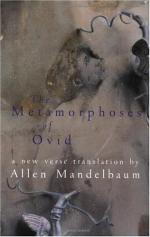|
|
Metamorphoses Topic Tracking: Women
Book 1: Io
Women 1: The role of women in Metamorphoses is very extreme. Either they are the virginal girls running from the gods who want to rape them, or they are malicious and vengeful. Io provides the perfect contrast of both characters because Io is the virginal water nymph and Juno is the bitch goddess who gets revenge on the girl despite the fact that Jove forced himself on her. The goddess always avenges herself against the women that Jove dallies with in spite of the fact that they didn't want anything to do with him in the first place.
Book 2: Callisto
Women 2: Here Callisto, the rape victim, is abused further by Diana, who ostracizes her, and then, of course, Juno, who transforms her into a bear to get her back for being attractive enough to make Jove rape her.
Book 4: The Sun in Love
Women 3: In this story, Clytie, a jealous woman, is responsible for the death of Phoebus' new lover. These stories constantly play women against each other. Juno is always seeking revenge against the women her husband has affairs with and mortal women are vying for the attention of other gods. Because of this, the women who are not victims in these stories often come across as petty and malicious because they are seeking to get back at some other woman.
Book 4: Salmacis and Hermaphroditus
Women 4: Here is a different sort of woman. Salmacis is aggressive, and she attacks Hermaphroditus instead of being attacked by him. Unfortunately, although sex is what she wants, she ends up becoming a permanent part of Hermaphroditus. Jove doesn't find himself in these situations when he wants to rape someone, but maybe that has more to do with him being a god rather than a man.
Book 6: Arachne
Women 5: A new type of woman appears in Book VI. No longer the victim or the jealous lover, some of the female characters in Book VI, Arachne and Niobe in particular, are boastful mortals who perceive themselves as greater than the gods. Although their presumption results in either their downfall or transformation, the swagger of these women is vastly different from the helplessness of some of the female characters that have appeared before now.
Book 7: Medea and Jason, Medea and Aeson...
Women 6: Medea is a well-known woman of mythology. She was a sorceress, and she was also ruthless. To get what she wanted, whether love or revenge, she would do anything. These stories show the depths of her cruelty by highlighting the way she betrayed her father for Jason's love, killed Jason's enemy, and then killed her own children when he fell in love with another woman. She is one of the most powerful women in mythology.
Book 8: Althaea and Meleager
Women 7: Althaea is put in a tough spot when she has to choose between avenging the deaths of her brother and saving her son. Because Meleager killed his uncles, she would have to kill him to avenge their deaths. It's a difficult decision for a mother to make, but Althaea decides to avenge her brothers, and so she destroys the brand that holds Meleager's life force, thereby killing her own son. There is a bit of Medea in that story.
Book 9: The Birth of Hercules
Women 8: Galanthis, Alcmena's servant girl, proved to be too smart a girl for her own good. Although she helped Alcmena deliver Hercules, the servant was changed into a weasel because she'd outsmarted Ilithyia, the goddess of childbirth.
Book 9: Byblis
Women 9: A new type of female character is introduced with Byblis and recurs later with Myrrha. The incestuous longing of these women is another way of showing women as evil and unclean. When these characters are raped even Juno sees it as their fault because their beauty attracted the gods. When the women are sexually aggressive or cunning, they are portrayed as wicked. Now we have the incestuous theme that is always initiated by the female character.
Book 12: Caenis
Women 10: After Neptune rapes her, she finds the solution to her problem, which is her gender, and she wishes to be a man so that she won't be victimized any more. There is some impressive truth about the role of women throughout these stories that is revealed in that one wish.




